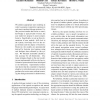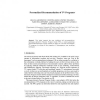110
click to vote
ACL
2003
15 years 3 months ago
2003
We address appropriate user modeling in order to generate cooperative responses to each user in spoken dialogue systems. Unlike previous studies that focus on user’s knowledge o...
118
click to vote
ICWE
2010
Springer
15 years 6 months ago
2010
Springer
Many Web applications provide personalized and adapted services and contents to their users. As these Web applications are becoming increasingly connected, a new interesting challe...
104
click to vote
AIIA
2003
Springer
15 years 7 months ago
2003
Springer
This paper presents the user modeling and recommendation techniques applied in Personal Program Guide (PPG), a system generating personalized Electronic Program Guides for digital ...
106
click to vote
UM
2005
Springer
15 years 7 months ago
2005
Springer
The paper proposes meta-ontology of the user modeling field. Ontology is meant to structure the state-of-the-art in the field and serve as a central reference point and as a tool t...
122
click to vote
UM
2005
Springer
15 years 7 months ago
2005
Springer
The A theory of user expectation of system interaction is introduced in the context of User Adapted Interfaces. The usability of an intelligent email client that learns to filter s...
103
click to vote
SIGIR
2006
ACM
15 years 8 months ago
2006
ACM
User modeling for information retrieval has mostly been studied to improve the effectiveness of information access in centralized repositories. In this paper we explore user model...
AH
2006
Springer
15 years 8 months ago
2006
Springer
Current adaptive systems acquire information about users mainly by simple tracking of resources, a user has requested and by asking users to supply the needed information. In this ...
126
click to vote
SOFSEM
2007
Springer
15 years 8 months ago
2007
Springer
Abstract. Large information spaces and complex functionality of contemporary systems together with the advent of the Semantic Web are big challenges for the design of simple yet po...
120
Voted
ADAPTIVE
2007
Springer
15 years 8 months ago
2007
Springer
The paper reviews the development of generic user modeling systems over the past twenty years. It describes their purposes, their services within user-adaptive systems, and the dif...
128
click to vote
ADAPTIVE
2007
Springer
15 years 8 months ago
2007
Springer
One distinctive feature of any adaptive system is the user model that represents essential information about each user. This chapter complements other chapters of this book in revi...


